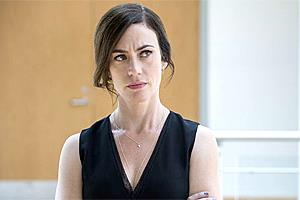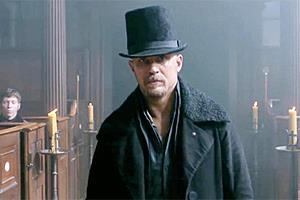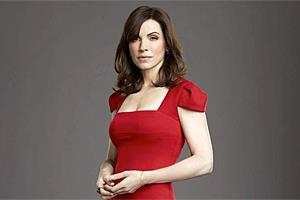A friend who’s just discovered The Good Fight told me the other day that she can’t believe how much she’s enjoying it. And then, in the next breath, she admitted she’d never seen The Good Wife.
This is the kind of admission that demands instant cross-examination. So when I asked her, in polite — read: sanitized— why not, she said there’s too much to watch on TV these days.
She then said that, as The Good Wife was a serialized drama that told its story chronologically — meaning she’d have to watch it from beginning to end, in sequence — the mere thought of binge-watching 150-plus episodes was too intimidating.
Her other friends, Good Wife followers all, were none too pleased with her. Somehow, over the course of seven years, she had managed to evade their Good Wife references over morning coffee without once letting on that she didn’t know Diane Lockhart from David Lee.
She knows now, of course. And not just because Christine Baranski’s Diane Lockhart (top) is the driving force behind The Good Fight and the lynch pin for the entire series. As with The Good Wife before it, Good Fight is both timely and topical in its pop-cultural and political references. This past weekend’s episode revolved around a former Good Wife character, Pastor Jeremiah — a not-so-thinly-veiled reference to Barack Obama’s firebrand Chicago preacher Jeremiah Wright, back in the day — and the African-American firm’s signing of tech giant ChumHum — “one of Silicon Valley’s whitest companies,” Louis Gossett Jr.’s Carl Reddick groused — as a client.
My friend, despite being new to Good Wife and Good Fight co-creators Robert and Michelle King’s unique ability to tie in socially relevant issues with hellzapoppin’ courtroom entertainment, has taken to her new TV obsession like Breaking Bad devotees have taken to Better Call Saul.
Still, the bigger issue — the assertion that she never watched The Good Wife because there’s too much good TV these days and, really, who has the time? — can’t be taken too lightly.
FX Networks CEO John Landgraf (right), one of the few television executives who runs both a mainstream cable network (FX) and the production studio (FX Productions) that produces many of its programs, has famously said that there’s too much quality TV these days, with the inevitable result that it will become financially unsustainable at some point, much like a stock-market/real-estate bubble that’s poised to burst.
The argument is that as fine, ambitious dramas chase ever more elusive viewers who are both demanding and ultra-specific in their tastes, there will come a point when even a respected, prestigious, award-winning drama may not pay for itself. The argument is similar to the one that says an effete Best Picture Oscar-winner that hardly anyone is willing to pay to see — unlike, say, the latest summer blockbuster or superhero popcorn-cruncher — is little help to a financially ailing studio industry that is constantly going through boom-and-bust cycles.

I know this from my own viewing habits. I personally found HBO’s ambitious recording-industry drama Vinyl to be unwatchable, despite initially positive reviews from critics I suspect were hornswoggled by its producer pedigree (Mick Jagger! Martin Scorsese! Terence Winter!). Showtime’s Billions was both well-reviewed and a shoo-in for second-season renewal; I, on the other hand, forced myself to watch the new season premiere, having suffered through the entire first season; I lasted nine minutes before deleting the entire thing from the PVR. (Sidebar: might Maggie Siff, right, be cornering the market on the most annoying, irritating characters on TV? Discuss.)
FX is not immune from my personal gripes. I admire The Americans greatly. I never cease to be amazed — awed, even — by Fargo, in all its incarnations and reinventions. I continue to be surprised, in a good way, by American Horror Story, despite its growing legion of critics. I found The People v. O.J. Simpson: American Crime Story to be sublime, even though I had little interest in seeing it at first. (Having been glued to CNN’s round-the-clock court coverage at the time, I thought American Crime Story would have little to add. I was wrong.)

But FX has also produced four ambitious dramas that, if Landgraf knew my personal tastes, could easily have been made with me and my TV needs in mind: the Middle Ages period epic The Bastard Executioner, the Middle East political drama Tyrant and, most recently, Tom Hardy’s atmosphere-steeped Victorian thriller Taboo (right). I found all three to be seriously wanting. Two have been cancelled; the third — Taboo — will be back for a second season, but I don’t hold out much hope for improvement, at least where my own tastes are concerned.
All three dramas were no doubt expensive to produce, so I can see Landgraf’s point about too many increasingly ambitious dramas chasing ever-shrinking, already specialized audiences being financially unsustainable at some point.
I’m glad someone at least tried to make Taboo, Tyrant and Bastard Executioner, though. I admired the late Penny Dreadful — I mourn its passing to this day — and continue to enjoy Ripper Street, though it’s nowhere near at the level Penny Dreadful was. Both are set in the same time period and milieu as Taboo; both were expensive to produce (by Showtime and BBC America/Amazon respectively), and in both cases the producing studios must have known from the outset that they would never be the money-making franchises broadcast dramas like NCIS, Criminal Minds and Hawaii Five-0 are.

As my friend has proved with The Good Fight, though, in today’s age of streaming and video on-demand, paying audiences can still come to the party long after a program has initially aired. I don’t doubt that she will get to The Good Wife (right) eventually; she’s enjoying Good Fight so much that, once the new episodes run out — any week now — she’ll turn to Good Wife to satisfy an appetite that, just a year ago, she didn’t realize she had. When that moment comes, she’ll be only too happy that there are 150+ episodes to work through, no matter how pressed she is for time.
Is there too much quality TV, as Landgraf asserts? Yes, certainly. When I can grouse about Taboo, Tyrant and Bastard Executioner not being quite up to my standards; when I can grouse about Vinyl and Billions being unwatchable, I’ve obviously been spoiled by choice. It’s easy to take what we have for granted.
Too much quality TV is not necessarily a bad thing. It may sound counterintuitive, but because something seems paradoxical doesn’t mean it isn’t true.
Whether too much quality drama is financially sustainable over the long term is an open book, if you’ll forgive the mixed metaphor. My friend is likely not alone in having never seen The Good Wife, but it’s there waiting for her. Financially speaking, The Good Wife is an asset that will be monetized for as long as there are video libraries, whether on Netflix or in the cloud somewhere. Thanks to streaming technology, once something is made, it will always be there, whether it’s as broadly pleasing as The Good Wife or as obtuse and narrowly focused as Tyrant, Taboo and Bastard Executioner.
I happen to like Ray Donovan (right) very much, even though I know some readers of this site don’t care for it as I do. (I know this because, the last time I wrote about Ray Donovan for TV Worth Watching, a couple of readers posted a dissenting opinion.)
There is too much good TV at the moment. But that’s, forgive the pun, a good thing. It’s why, as this site’s founder has said — written an entire book about it, in fact — we’re living in TV’s platinum age.